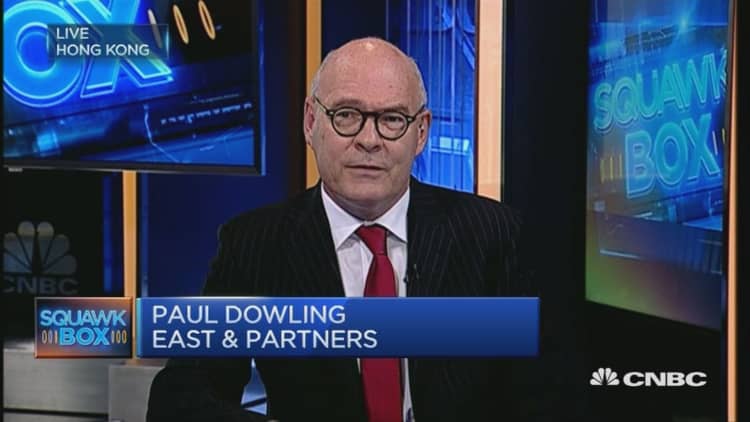
One of Wall Street banks' biggest businesses is taking heat from competitors old and new.
Many big banks are seeing fees from wealth and investment management divisions fall, putting a crimp in critical revenue at a time when Wall Street is having an increasingly tough time matching their return on equity targets.
Goldman Sachs' most recent earnings report noted that investment management net revenue of $1.35 billion fell 18 percent from the second quarter of the prior year, and on the bank's earnings call CFO Harvey Schwartz noted that average fees are coming down. While fees are falling all over Wall Street, there's a chance that at least Goldman can make it up in the long run on volume: the bank said it saw client inflows in both cash and long-term assets.
Other wealth managers are seeing top clients add to cash holdings on fears of market turbulence and geopolitical conflict. And falling fees on Wall Street rarely come without job cuts too far behind them.
Fewer transactions, more loans
UBS' wealth management Americas business has grown increasingly dependent on recurring income from products including investment funds, according to its earnings reports, and less on transaction-based revenue, which is on the decline. The bank did not respond to a request for comment.
Investors' declining trading activity comes as yield has become increasingly scarce, and if the trend persists, it could mean that other investment alternatives, whether robo-advisors or index funds, gain traction.
"Brokerage fees are already being eroded in both of these jurisdictions as cheap beta products become readily available and increasingly accepted," said a joint report covering wealth managers last month from Deutsche Bank Markets Research and consulting firm Oliver Wyman, entitled "Running faster to stand still."
At big banks, at least, wealth management teams have increasingly turned to selling lending products to wealthy individuals, more than helping them make trades, the report said. At Morgan Stanley, the bank's second-quarter numbers reflected a 24 percent increase in loans within its wealth management division. The bank declined CNBC's request for comment.

At a time when investors have at their fingertips a much broader swath of data with which to make decisions, it's not clear whether the advice and fees the big banks charge will be worth it to customers in years to come.
"The investors have become more sophisticated," said Timothy Speiss, partner and chairman of EisnerAmper's personal wealth advisors practice. "They have a lot more questions; they question fees. Investors are more astute now."
As more of banks' wealthy clients access data independently, some of their smaller, younger potential customers are being siphoned away by digital apps that allow users to transact without making a phone call or visiting a bank branch.
Robo-advisors, which have enjoyed growing popularity as millennials and others look to use low-fee, automated options for investing, have been on the rise in 2016. One of them, Betterment, reported that assets under management rose from $4.8 billion earlier this year to $5.3 billion, a company spokesman said this week. The company restricted trading in the post-Brexit sell-off, which may have prevented many retail investors from shooting themselves in the foot.
Morgan Stanley, which also saw year-over-year revenue in its wealth management division fall in the second quarter, has been boosting its presence in the digital end of the business. Earlier this year the bank added Naureen Hassan, a Charles Schwab veteran who ran that firm's Intelligent Portfolios business, as chief digital officer for its wealth management business.
"Digital is far more than just robo," Morgan Stanley CFO Jonathan Pruzan said on the bank's earnings call last month. "We've been investing heavily in this area."


